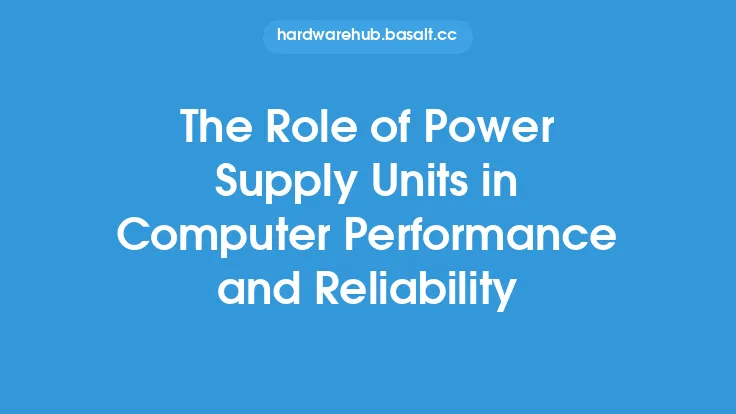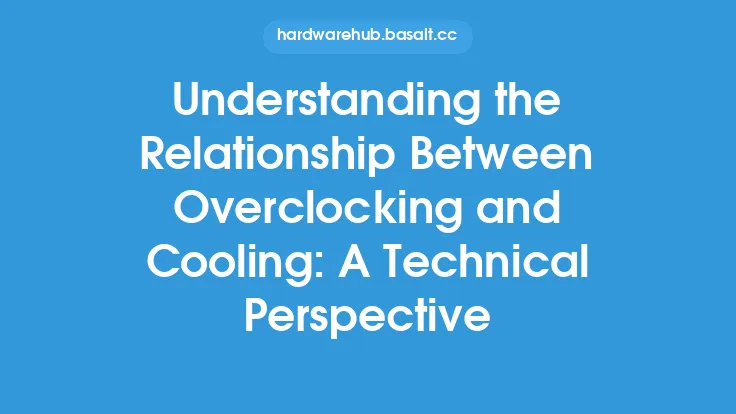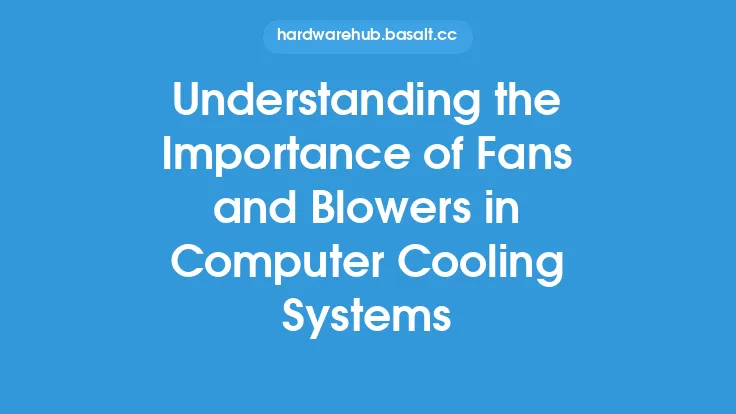When it comes to building or upgrading a computer, two crucial components that often get overlooked are the power supply unit (PSU) and the cooling system. While they may seem like separate entities, they are actually closely related and can have a significant impact on each other's performance. In this article, we will delve into the relationship between power supply units and computer cooling systems, exploring how they interact and affect each other.
Introduction to Power Supply Units and Cooling Systems
A power supply unit is responsible for converting AC power from the mains to DC power for the computer's components, such as the CPU, motherboard, and graphics card. The PSU plays a critical role in ensuring that the system receives the necessary power to function properly. On the other hand, the cooling system is designed to dissipate heat generated by the computer's components, preventing overheating and damage. The cooling system typically consists of a combination of air and liquid cooling solutions, including fans, heat sinks, and radiators.
Heat Generation and Power Supply Units
Power supply units generate heat as a byproduct of converting AC power to DC power. The amount of heat generated depends on the PSU's efficiency, with more efficient units producing less heat. The heat generated by the PSU can be significant, especially in high-power systems, and can affect the overall temperature of the system. If the PSU is not properly cooled, it can lead to a decrease in its lifespan and performance. Furthermore, a hot PSU can also increase the temperature of surrounding components, such as the motherboard and CPU, which can lead to system instability and damage.
Cooling System Impact on Power Supply Units
The cooling system plays a crucial role in keeping the PSU at a safe temperature. A well-designed cooling system can help to dissipate heat from the PSU, reducing its temperature and increasing its lifespan. There are several ways that the cooling system can impact the PSU, including:
- Airflow: The cooling system's airflow can help to cool the PSU by drawing heat away from it. A good airflow can reduce the PSU's temperature, increasing its efficiency and lifespan.
- Temperature: The cooling system's ability to maintain a low temperature can help to reduce the PSU's temperature, preventing overheating and damage.
- Dust buildup: The cooling system's filters and dust-reducing features can help to prevent dust from building up in the PSU, which can reduce its efficiency and increase its temperature.
Power Supply Unit Impact on Cooling Systems
The power supply unit can also impact the cooling system's performance. A high-power PSU can generate a significant amount of heat, which can increase the temperature of the system and put additional strain on the cooling system. This can lead to a decrease in the cooling system's performance, reducing its ability to cool the system effectively. Furthermore, a PSU with a high wattage can also increase the power consumption of the system, which can lead to increased heat generation and reduced cooling system performance.
Interdependence of Power Supply Units and Cooling Systems
The power supply unit and cooling system are interdependent, meaning that the performance of one can affect the other. A good PSU can help to reduce the heat generated by the system, making it easier for the cooling system to maintain a safe temperature. On the other hand, a good cooling system can help to keep the PSU at a safe temperature, increasing its efficiency and lifespan. This interdependence highlights the importance of choosing a PSU and cooling system that are compatible and can work together effectively.
Factors to Consider When Choosing a Power Supply Unit and Cooling System
When choosing a PSU and cooling system, there are several factors to consider, including:
- Wattage: The PSU's wattage should be sufficient to power the system's components, while also considering the cooling system's ability to dissipate heat.
- Efficiency: The PSU's efficiency can impact the amount of heat generated, with more efficient units producing less heat.
- Cooling system type: The type of cooling system used can impact the PSU's temperature, with liquid cooling systems generally being more effective than air cooling systems.
- Airflow: The cooling system's airflow can impact the PSU's temperature, with good airflow helping to reduce the PSU's temperature.
Best Practices for Power Supply Unit and Cooling System Maintenance
To ensure that the PSU and cooling system work together effectively, it is essential to follow best practices for maintenance, including:
- Regular cleaning: Regularly cleaning the PSU and cooling system can help to prevent dust buildup and reduce the risk of overheating.
- Monitoring temperatures: Monitoring the system's temperatures can help to identify potential issues before they become major problems.
- Upgrading components: Upgrading the PSU or cooling system can help to improve the system's performance and reduce the risk of overheating.
Conclusion
In conclusion, the power supply unit and cooling system are closely related and can have a significant impact on each other's performance. By understanding the relationship between these two components, users can make informed decisions when choosing a PSU and cooling system, ensuring that their system runs efficiently and effectively. By following best practices for maintenance and considering factors such as wattage, efficiency, and cooling system type, users can help to ensure that their PSU and cooling system work together in harmony, providing a stable and reliable computing experience.





